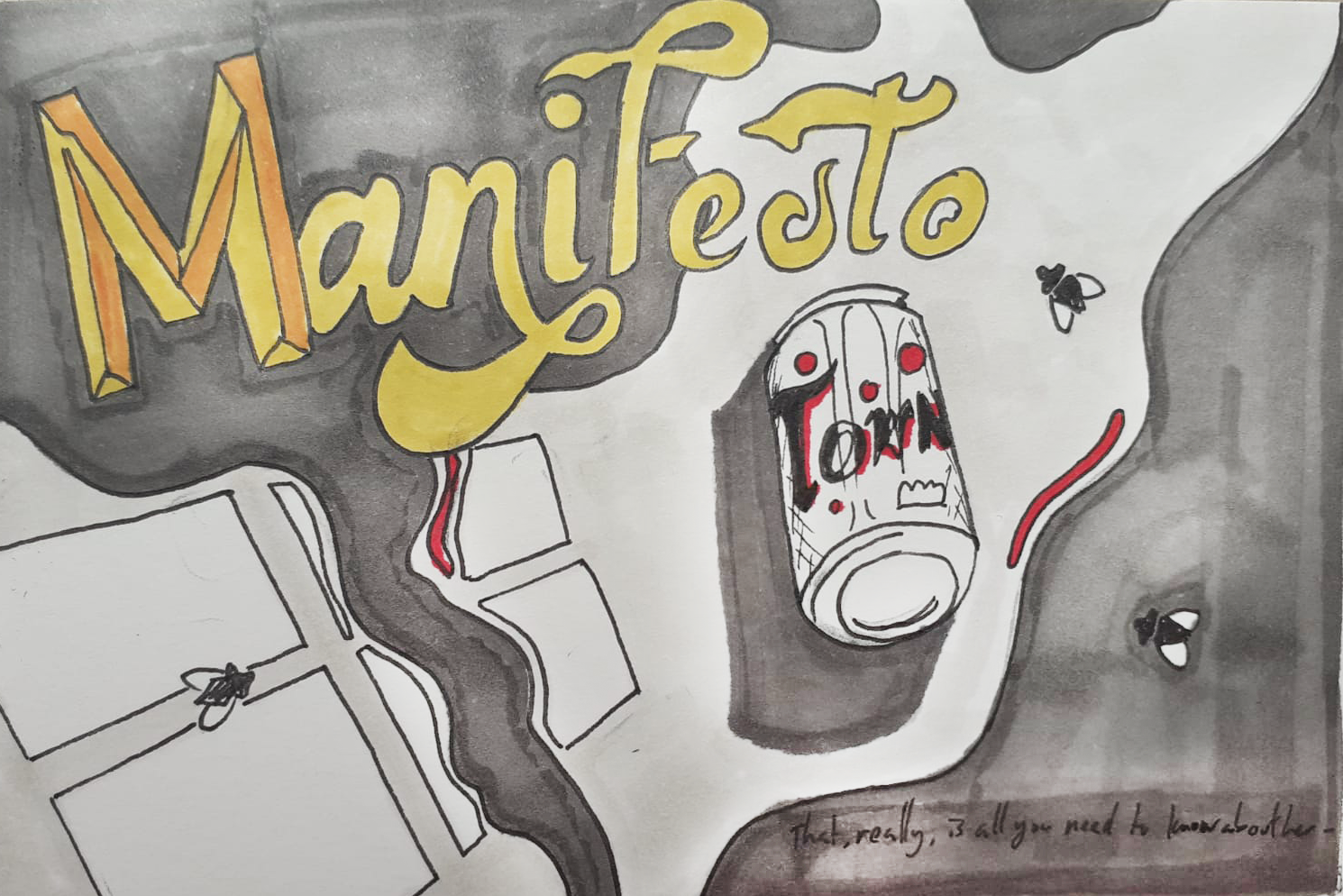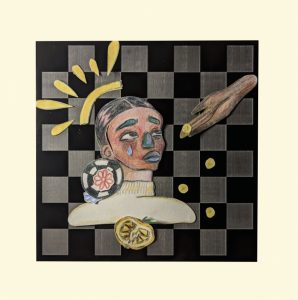
Manifesto Town
by Jiayue Shi | March 28, 2023
Believe me: when I scoop water into my palms, I see her face trembling at the surface. Dream your last dream, blow out the lamp, and believe me. In the cradling light her eyes reproach me and seem to say: I am being written against my will, you trickster. She whispers her name in my ear and asks me not to tell.
She writes mediocre poetry. That, really, is all you need to know about her – that her words are clammy and give off a dull gleam, though she loves them well; that never in her life will she be capable of writing a speech or a love confession or a manifesto; that it is impossible to inflict upon her senses anything more powerful than a vague, persistent twinge of dissatisfaction – dissatisfaction with what? She doesn’t know – and that the kernel of her existence is a small, pale fire of hypersensitivity, wondrous and secretive and never to be put into words, because, as we have already established, she writes mediocre poetry.
When summer arrives in the city where she lives, it finds her already waiting, slightly ajar. In this place the summers are viscous and comatose – notoriously so, a great steam room with flesh for walls. As the long bare days seep into one another, she waits in the bowels of the city for something terrible and extraordinary to happen, perhaps – I can venture to guess – so she can vindicate her right to be forever dissatisfied. The afternoons are long and heavy, like the waxing of a tall candle; they enfold her young body and never has she been more aware of her damp, untended skin, the wonder, the shame, the growing bones.
There is nothing much to do other than to go to the air-conditioned shopping mall, fight toddlers for the swing set, watch old men downstairs drink and swear and play cards, and scratch out a few lines of mediocre poetry. Does she know they are mediocre? Possibly. She has read them and furrowed her brows. She has read them the way a child tries to read the secrets of the universe in a cat’s cradle, but of course, there is no cat, no cradle, and like a child she is disappointed. She wishes to love one thing only and love it to exhaustion, to vomit one word that is worth her while, one word to silence it all: her buzzing heart, the knocking of flies against hot windowpanes, foghorns over the river, the loud and vulgar rotting of pears in the food market, the deep rumble of streets, of the viscera of streets, the night sky cracking down the middle and the resounding boom of its atomic yolk, radios singing, toddlers gurgling, young girls shrieking with laughter, with insolence, with fear, lips of patriarchs flapping on televisions, on plaza screens, on the face of the nation, and the voices of old men playing poker downstairs bellowing dà wáng, dà wáng – Joker! Joker!
But this will not come to pass. The girl’s careful words have always lain shrivelled on her balcony, under the evening birds that pass and pass, through her girlhood and out of it. But she does come close, once, on a subway platform one late afternoon in July. The country is hot and cavernous on this day, its metal spine groaning. To her left a railway worker is smoking under a broken lamp. A straggling crowd moves around him. In the hanging twilight, bodies take sluggish animal forms, outlines slowly lose definition until you could swear they are dissolving into the city itself. Smoke passes into smoke, water into water, impressions of faces rippling into the carnivorous sky. The girl thinks: everyone is happy and dying and good and forever waiting in vain. The thought holds, expands, tunnels; a breeze snatches through her, now hot, now cold. Past the balustrade the sun flares and she can feel herself skin to skin with a long bare day, her body as shapeless and primaeval as a spasm of white rage, slowly dissolving and passing happily unnoticed through walls of flesh, walls of heat, walls of reason. Am I happy? Of course I am! Happy and dying and forever waiting in vain for stars, stars, stars. A can of soda is passed into her hand.
Of the friend who passes her the soda we know little, only that she is of the ambitious, decisive, brilliant sort whose mind’s inner workings are so appallingly different from the girl’s that they have no choice but to love each other. Their shoulders brush as the cicadas shrill from treetops; the soda is cheap and bitter and miraculous on her tongue; neither is going home yet, and just for that, all is well. A light flickers in the distance. “When you’re old and famous,” her friend suddenly says, “you’ll write a book about me, won’t you?”
The girl knows she won’t. She will never truly create anything in her life, not a word, not a sound, not even a baby. She will burst with existence on the inside, as near to the wild heart of life as anyone can get, but to close that final distance will require her to fight for it, spill her blood for it, and on principle she does not fight. How could she, she who cannot write a speech or a love confession or a manifesto? Instead, she will greedily and perversely swallow the marrow of dissatisfaction until she bursts like a supernova, quietly, without creating a thing. Even now, she has an inkling of this future and lives in pre-emptive sorrow.
“I will,” she says to her friend, uncharacteristically excited. Drinking soda from a can has that effect on some people. “Tell me more.” For all of a sudden she wants so very much to hear a human voice – her friend’s shimmering voice, no less – to affirm to her that there may yet be real, rare, wonderful things to be had.
“The earth will be ours,” the friend begins. Then the subway arrives; a gust of hot air lifts her hair from her neck, and as her reflection wavers over the uneven rushing glass, she thinks she has caught a glimpse of something vast – some tender, painful truth, and she wants to cry out, there you are! But the doors part and the sudden glimmering vision is gone.
In the half-empty compartment, the cool air is still. They were at the swimming pool earlier and both are sore and blissfully tired. “I just wish I knew how to do eyeliner right,” the girl says.
“Or we’ll just get obscenely rich, that should be enough,” her friend continues sleepily.
A beat of silence. In the silence the girl feels a serenity bordering on agitation. “Let there be no wars tonight,” she says.
No wars tonight. The itch of every new mosquito bite, the dusk that reels in and out, the monotone of garish commercials and party catchphrases pressing down on her windpipe, the point of contact between her knee and her friend’s knee, between her hipbone and the bench, humming glass, the smell of eucalyptus oil, the crepuscular seasons filing out of the city that owes and promises her nothing – a hundred sensations gain sharpness and hammer into the space she occupies the shape of an actual, solid person. It is as if seventeen years after her birth she finally fully registers the fact – can you believe that! She is so startled, too!
Suddenly she realises she doesn’t want to wait in vain. She wants everything, everything, so much that tears almost flood her eyes. She stares at a wheeling skeleton of amber light across the aisle, and it is not until some twenty years later that she will see the light again, in a dream, reproduced photon-for-photon. Wadded with time, with the stuff of water and soft earth, that see-saw of light, spinning, spinning, spinning. A terrible and extraordinary thing to set the heart bleeding. She feels her pulse in the top of her skull, and out of habit she does not let her heart get too loud, lest everything go out in a shout.
That very night she comes down with a fever and doesn’t call her friend for days. She sleeps through meals and dreams complete darkness, only waking in the early hours of morning to cross a narrow, dark blue hallway barefoot, to go to the bathroom and look uncomprehendingly at herself in the mirror. Sluggish animal eyes in a featureless face. She cannot tell if the tap water is hot or cold. By the time she recovers, her friend has left to go to her grandparents’ for the rest of the summer. What now? The swing set creaks, the grass grows tall and accusing, she is older, she is alone, she is leaving.
The rest is inconsequential, but I will nonetheless try to give an account of it here. For years she dwells in many cities and looks up into many a floating windowpane on nights she evicts herself from her room, out of a sudden revulsion for walls. She drifts absentmindedly through the peculiar humanoid preoccupations of book-learning and money-seeking and romance, and in the end she finds herself with a small fortune and not much else.
Twice she attempts to publish a poem – once she is rejected, the other time she withdraws out of a sudden embarrassment. Not for her own mediocrity, but for the coarseness of paper and print, the impossible lack of intimate tremor in them, the wrong language, the shame, the treason. Prideful creature, she won’t admit it, what she feels in her bones can only stay in her bones! She buys a television and watches it every night in the dark: in this insubstantial light she is almost transparent, a projection from the screen. Our century flickers all over her skin in a merging spectacle of distant explosions, driving rain and slaughtered doves, jokes and jokers, every one.
She speaks seldom but loudly. She takes a liking to coriander. She attends the weddings of many friends and gets so drunk and excited during one of them she almost proposes to a stranger on the spot. Later, she hastily slips out onto the balcony. In a rare, unexpected moment of vindictive satisfaction, she turns her face to the rude and overwhelming night, an anarchic tectonic sky aswirl with discordant music, so vast it is almost like grief, like conviction, and demands of the stars: Kisses! Kisses! The leaves turn and turn, put wrinkles on her body and something else in her chest. She is nobody’s wife, nobody’s daughter, nobody’s citizen, nobody’s poet, nationless, speechless, smouldering in silence for madness, for disintegration, for offence, always unfazed, always afraid, always hard as a small brown nut and indestructible.
Slowly she cracks like an overripe fruit; time unspools like an umbilical cord when she applies lipstick to her old, cracked lips. As she lies dying, she will be conveyed out of existence by a subway train, alone in the empty compartment, a thin dress billowing around her in slow underwater motion. The air is cool, but the glass windows are feverish. The train is moving very fast. Flies, dead or alive, knock against the windows, pattering like beads.
Memories of cities heave and flow, pushed straight up against the carriage, a living thing with heart, lungs, liver, tassels of tendons, through which pumps the fast-flowing, dream-giving ichor of rain, wind, drainage water, television fire, river fire, sacrificial twilight fire. From the distance comes the high-pitched ringing of tinnitus, all sounds tuning themselves to that prolonged twang – the annihilation of self-awareness! The evening birds that pass, the fracturing of glass, the earth that showers on our graves! The stars that cleave through us and give us no peace – the heat – the heat – her eardrums burst and start bleeding. The warm pulp of her brain, her throat, her webbed arteries bleed out of her ears and touch her. Soon the outsides of windows are washed in red. In the red reflection she sees a cat, a cradle, a wheeling light, and her eyelids start to droop. Sleep now? After everything? What about the rest of us? Who can save us now? I have warned you: she is no lamb. The train is pummelled into itself, space, too, collapses in a whoosh. A leaf turns. At last, the silence of the world.
The doors part. A gust of hot air slowly settles. She shakes her head and her vision clears. She enters, stands with her back to the window and passes the soda back to her friend. Behind her, a new crowd sweeps past, and in the compartment, she is stacked like a canned sardine against more sardines, perfectly lost, unheeded, free, suspended inside herself, and in a moment she will realise it is not enough after all.
Her face trembles in my palm, in the water, but it could just be my own hands shaking… but you, don’t you lose sight of her. She mustn’t be allowed to dissolve! Spill her blood if you must. Perhaps before long she will spill it herself, and this might yet save her, save us all. Watch the future come to her tonight and shudder in her arms. Watch as her breath leaves her in a rush. I will begin, then, by telling you her name.
Words by Jiayue Shi. Art by Oliver Roberts.




